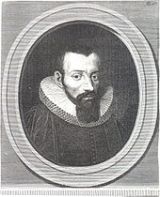Bartholomäus Keckermann (c. 1572–1609) was a German Reformed theologian in the early Post-Reformation era. Below he speaks about justification by faith alone:
“What is the instrumental cause of Justification?
Only faith in Christ, insomuch as by faith, even as by a hand and instrument we lay hold on, and apply unto us the merit and satisfaction of which Christ has performed for us.
What is faith?
Faith is not only a bare knowledge of the history of Christ, but it is also a sure confidence of the heart, whereby we set down in ourselves for certainty, and be persuaded that our sins are forgiven us of God for the death and passion of Christ [Syst. Theol. pag 427. Calv. Instit. lib. 3.ca. 2.]. Note here two main errors of Popery, whereof the first is, that faith only a certain historical knowledge, and no true and sure confidence of the heart: whereunto the Scripture itself directly speaks, Rom. 14.15. and Heb. 10.22. where faith is called pure trust and persuasion [Calv.Instit. Lib.3.cap.14 & 15. & 17 & 18]. See my Gymnasium logicum, where you have this in that theme Fides, somewhat opened. The second error is that we come by the remission of sins, not by faith alone, but also by the merit of good works; contrary unto those sayings in the Scripture, Ephes 2.8. ‘By the grace of God you are saved through faith, and not of yourselves.’ Rom. 4. ‘Abraham believed, and that was imputed unto him for righteousness.’ Again, ‘unto him not that works, but that believes in him, which justifies the wicked, by faith is counted for righteousness.’ Luk. 8. Mark. 6. says Christ, ‘only believe’: which is all one, as if he had said, ‘By faith alone thou shalt obtain everlasting life.’ So then although these words be not manifestly extant, by faith alone are we justified, yet the sense is manifestly out down, and other words thereunto equivalent are contained in the Scripture: for whereas the Apostle says, Rom. 3.28. ‘We conclude that a man is justified by faith without the works of the law.”
– Bartholomäus Keckermann (c. 1572–1609), Heavenly Knowledge, p. 139-141

